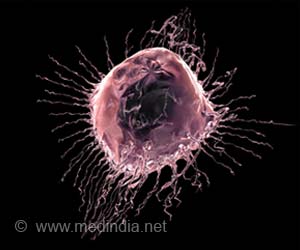Despite it being the number two killer in our nation, Americans are very optimistic about the war against cancer.
Despite it being the number two killer in our nation, Americans are very optimistic about the war against cancer. In fact, according to a recent nationwide survey sponsored by Abbott, nearly two-thirds (64%) believe the scientific community is winning the war against cancer.
"As an organization researching new options to fight cancer, Abbott is hopeful that its efforts will live up to the optimism expressed by Americans regarding the future of cancer therapy," said John Leonard, M.D., vice president, Global Research and Development, Abbott. "With cancer accounting for nearly 25 percent of all deaths in the United States, we're focused on investigating targeted, less toxic therapies that fill unmet treatment needs."While most Americans believe that cancer breakthroughs are on the horizon, less than half think a major breakthrough is near. Four out of five (82%) surveyed expect to see new breakthroughs in the next 25 years, but only 42 percent see those breakthroughs occurring in the next decade.
The survey results come just before the American Society of Clinical Oncology (ASCO) Annual Meeting commences in Chicago on June 1. Leading cancer researchers come together each year at the ASCO Annual Meeting to share medical advances and revolutionary approaches to cancer treatment. During the meeting, scientists from independent academic institutions and Abbott will present data on several of Abbott's investigational anti-cancer compounds including a PARP inhibitor (ABT-888) that seeks to enhance the effectiveness of common cancer therapies, a multi-targeted kinase inhibitor (ABT-869) being investigated to suppress tumor growth by cutting off its blood supply and an antimitotic agent (ABT-751) that has shown early promise in the treatment of pediatric neuroblastoma.
In addition, an Abbott scientist will lead an educational session on Abbott's Bcl-2 family protein inhibitors (ABT-263) which restore apoptosis -- the natural process by which damaged or unwanted cells die and are cleared from the body.
According to the survey, Americans also recognize that progress in the fight against cancer is already being made. Four out of five (83%) believe the chances of surviving cancer are better now than they were ten years ago. And almost half (48%) think the chances of survival are "much better" today.
"Abbott has several promising anti-cancer compounds in its oncology pipeline that may prove to be very effective in the fight against cancer," said Stephen Fesik, Ph.D., divisional vice president, Cancer Research, Abbott. "We are committed to exploring new cutting-edge therapies that may enable patients to live longer and healthier lives. Our strategy involves targeting the differences between cancer cells and normal cells and taking away the key fundamental needs of cancer."
Advertisement
Source: PRNewswire
LIN/M





